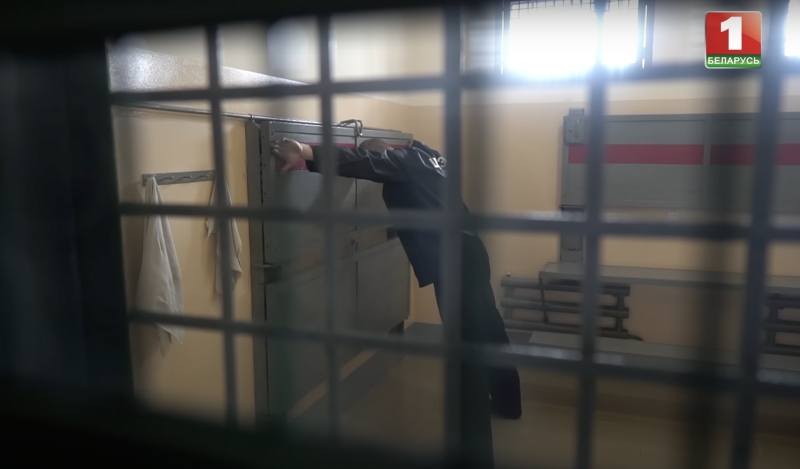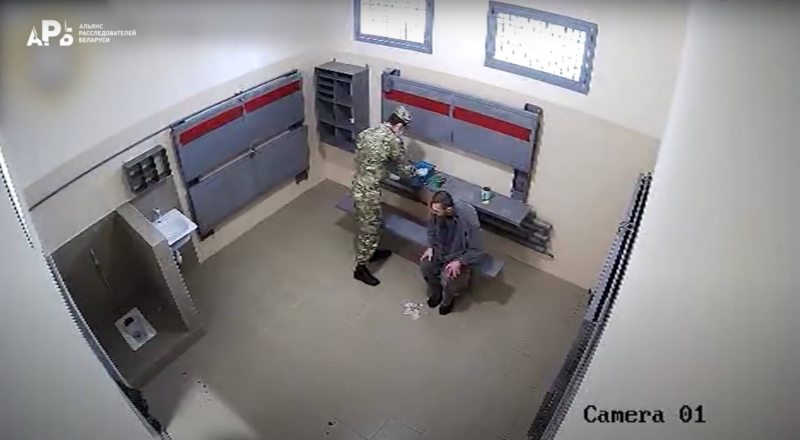"There are no rules: they will do what they want." A former political prisoner spoke about the detention conditions in a punitive confinement cell where Vitold Ashurak died
A former political prisoner (who is not named for security reasons) was imprisoned for almost two and a half years. He served his sentence in Šklou colony No. 17 for participating in protest actions. But the fact that it was the colony where activist Vitold Ashurak died, he learned only after his release. In the Šklou colony, the former political prisoner was also placed in a punitive confinement cell — presumably the same one where Vitold died. Before that, the head of the colony told him: "Take care of yourself!" The former political prisoner told Viasna about the conditions of detention in a punitive confinement cell in the Šklou colony, where he was kept alone for three weeks.

- A prisoner of the Šklou colony No. 17 in a punitive confinement cell. Screenshot from a BT TV-channel report
"I'll freeze at night and won't wake up in the morning if I don't hold on to the radiator pipe"
The political prisoner was, presumably, in the same punitive confinement cell where Vitold Ashurak died. He realized it and reported the facts when he was already released from the colony.
"I understand now that the head of the colony, who told me before the punitive confinement cell: "Take care of yourself," probably thought that I knew that it was here where Vitold Ashurak died."
The former political prisoner was held alone in a punitive confinement cell for three weeks. According to him, from 7 AM to 2 PM, a window was opened in the cell. This was done regardless of the weather: it did not matter whether it was frosty or sunny outside. According to the former political prisoner, when he was kept in a punitive confinement cell with an open window, it was up to minus 15 degrees Celsius outside. Several times the window was not closed until 5 PM.
"It was very cold in the cell. You could only keep warm by holding on to the radiator with your hands. But these are not a regular radiator, but two welded pipes, and between them there is an entrance and an exit. It's impossible to [keep warm] there in any other way. When I went to bed at night, the instinct of self-preservation told me in my thoughts that I would freeze at night and would not wake up in the morning if I did not hold on to the radiator pipe, because it was the only thing that saved me. So going to lie down on the cold bed was the most unbearable and scary thing. Of course, there was no sleep. I often woke up because of the cold in my legs or hands. Then I went to the radiator for a minute to warm up. But you are not allowed to walk around the cell after lights out. So I somehow warmed up for a minute and had to go to "sleep" again, if I may say so."
"I wrapped my feet with a cleaning cloth at night"
For three weeks, the political prisoner slept on a wooden bed without a mattress, linen, pillows, and blankets.
"The uniform for the punitive confinement cell is quite rough. It is very uncomfortable to wear. You have just slippers and socks on your feet. My feet were very cold. I wrapped my feet with a cleaning cloth at night."
"It's very difficult not go insane there"
According to the former political prisoner, the temperature in the punitive confinement cell was constantly kept around 10 degrees Celsius. Only a cleaning cloth, a small piece of soap, and toilet paper were provided.
"According to their rules, when the wardens open the door or look through the peephole of the door, you have to go to the bed fastened to the wall, spread your legs wide, and put your hands with the back side on the red line that is depicted on the beds. If the wardens notice through the video camera or the peephole of the door that you are starting to fall asleep, they start knocking hard on the door and shouting. For this, you can get another day of the punitive confinement cell."
According to the former political prisoner, the attitude of the colony staff was mostly humiliating.
"When they see through the video camera that you are starting to fall asleep, they immediately come up and just shout. During the day, you are allowed only to sit or walk there and that's it. Reading and writing are not allowed. There it was necessary to endlessly ask for toilet paper, because they give only a piece of it. But if you ask, you can't be sure that they will give it."
At the same time, for three weeks in the punitive confinement cell, the former political prisoner was never taken to the shower. He said that there was not enough food in the punitive confinement cell:
"The food was varied there, but the portions were not enough. You eat and then think about how to endure until the next meal. So the time passed in waiting. One looses a lot of energy due to the fact that it is very cold there. I lost a lot of weight there (about 17 kilograms in total during my imprisonment)."
The former political prisoner notes that pressure on political prisoners with the participation of so-called provocateurs is practiced in the Šklou colony. Other prisoners may provoke them into fights and disputes, which are the basis for the imposition of penalties.


















